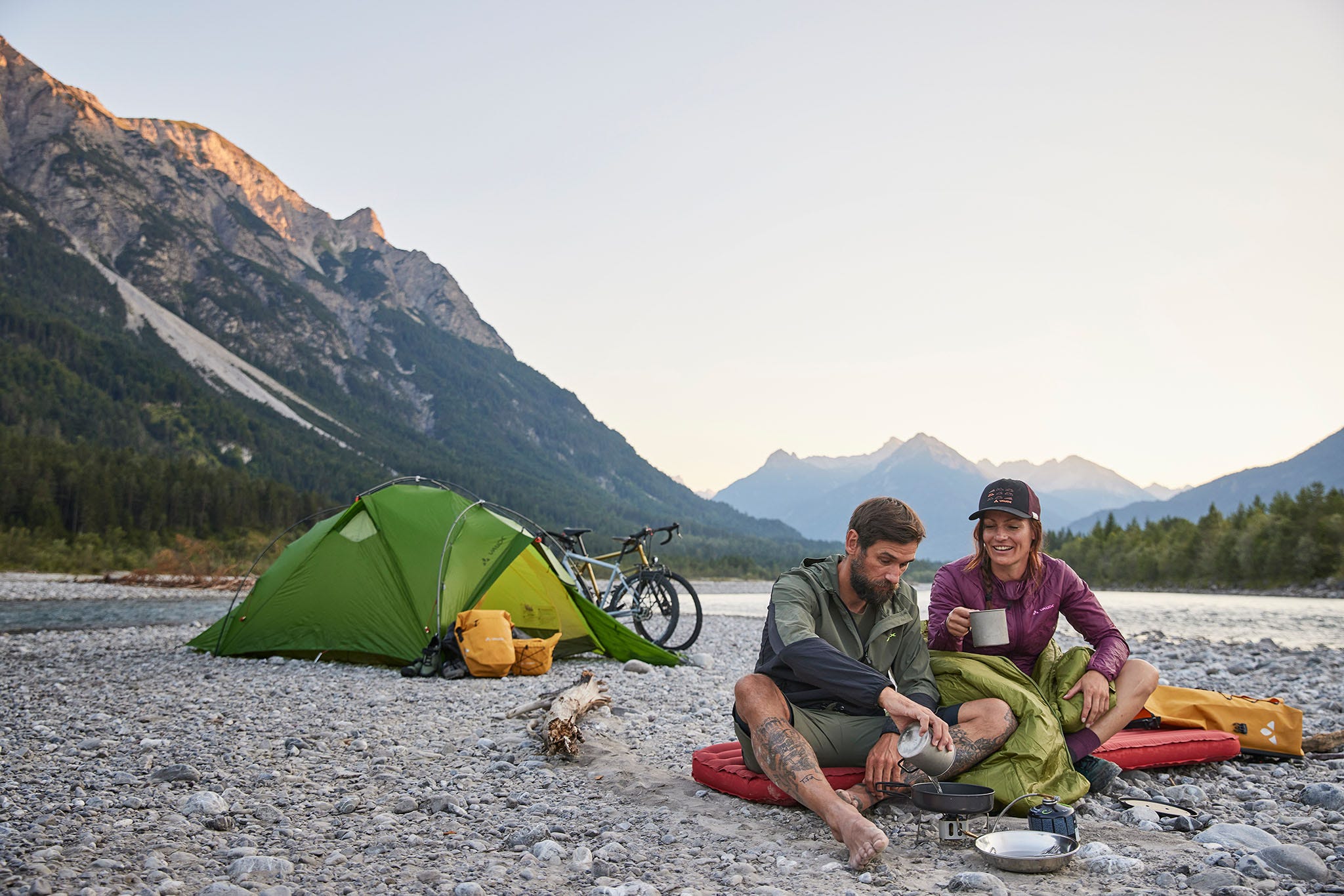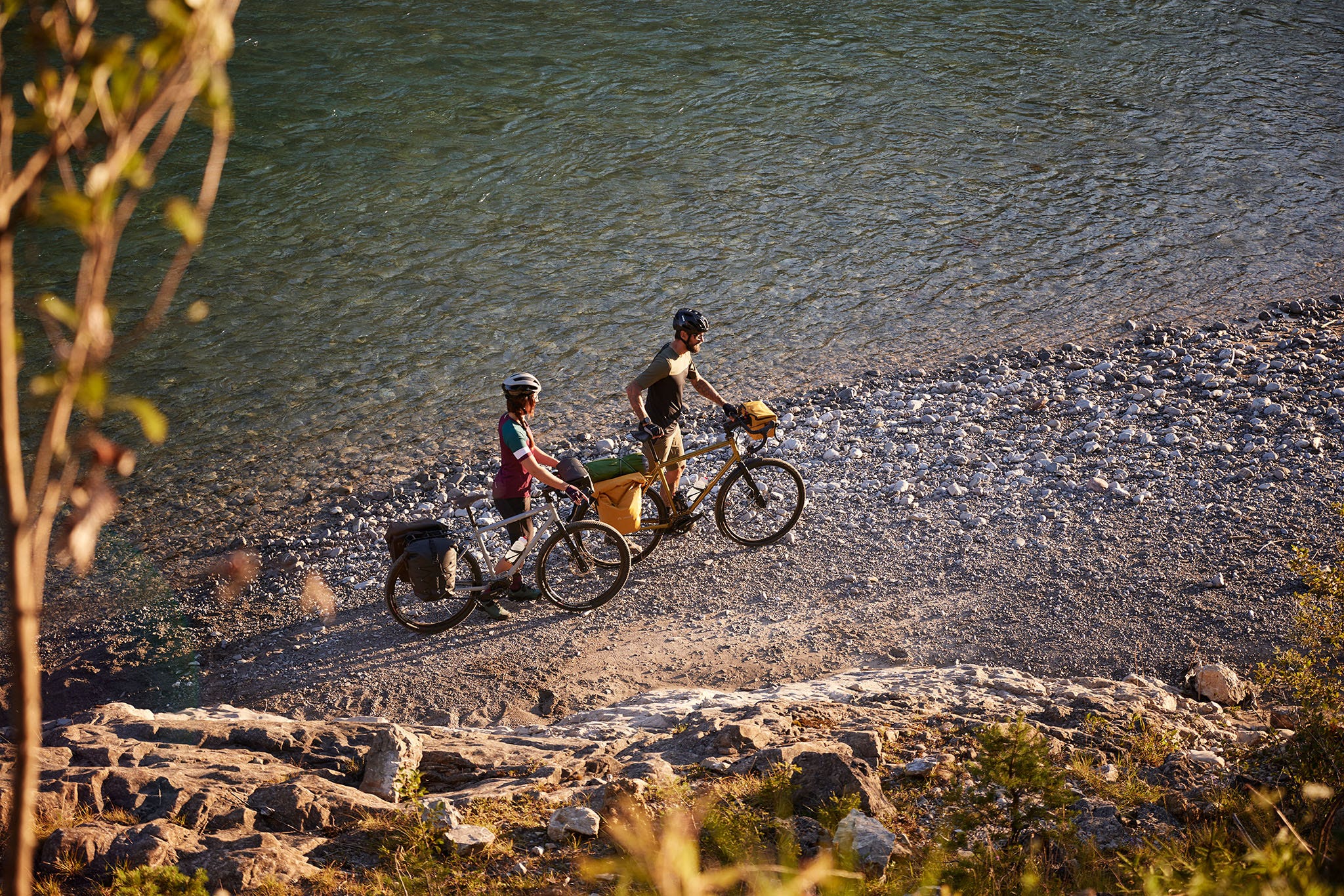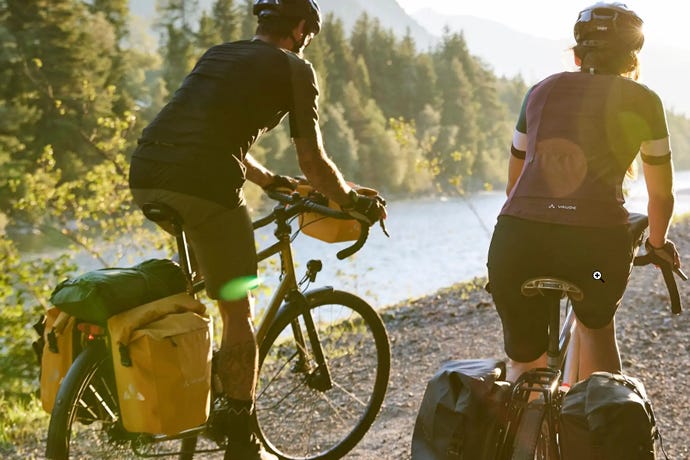Sustainable Bicycle bags - Made in Germany
For many cyclists, a bike bag is an indispensable companion in daily life. What if it were possible to make them entirely from recycled materials? A true circular economy, in other words? Made in Germany. We managed to use recycled plastic not only for the pack sack, but also for the entire fastening system. For the back plate, we used an innovative material made from recycled plastic car parts, such as bumpers. We give you an insight into the challenging history of its creation.
Many years of work have gone into the project. Constructing a bicycle bag from recycled materials may sound like a small thing. But the supporting elements required technical pioneering work. From the idea to the dress rehearsal and market readiness, it was not an easy path.
Why so much effort? We have set two important goals in our VAUDE climate strategy: to reduce greenhouse gases by half by 2030 and by 90% by 2040. The switch from petroleum-based plastics to recycled plastics plays a major role in this.
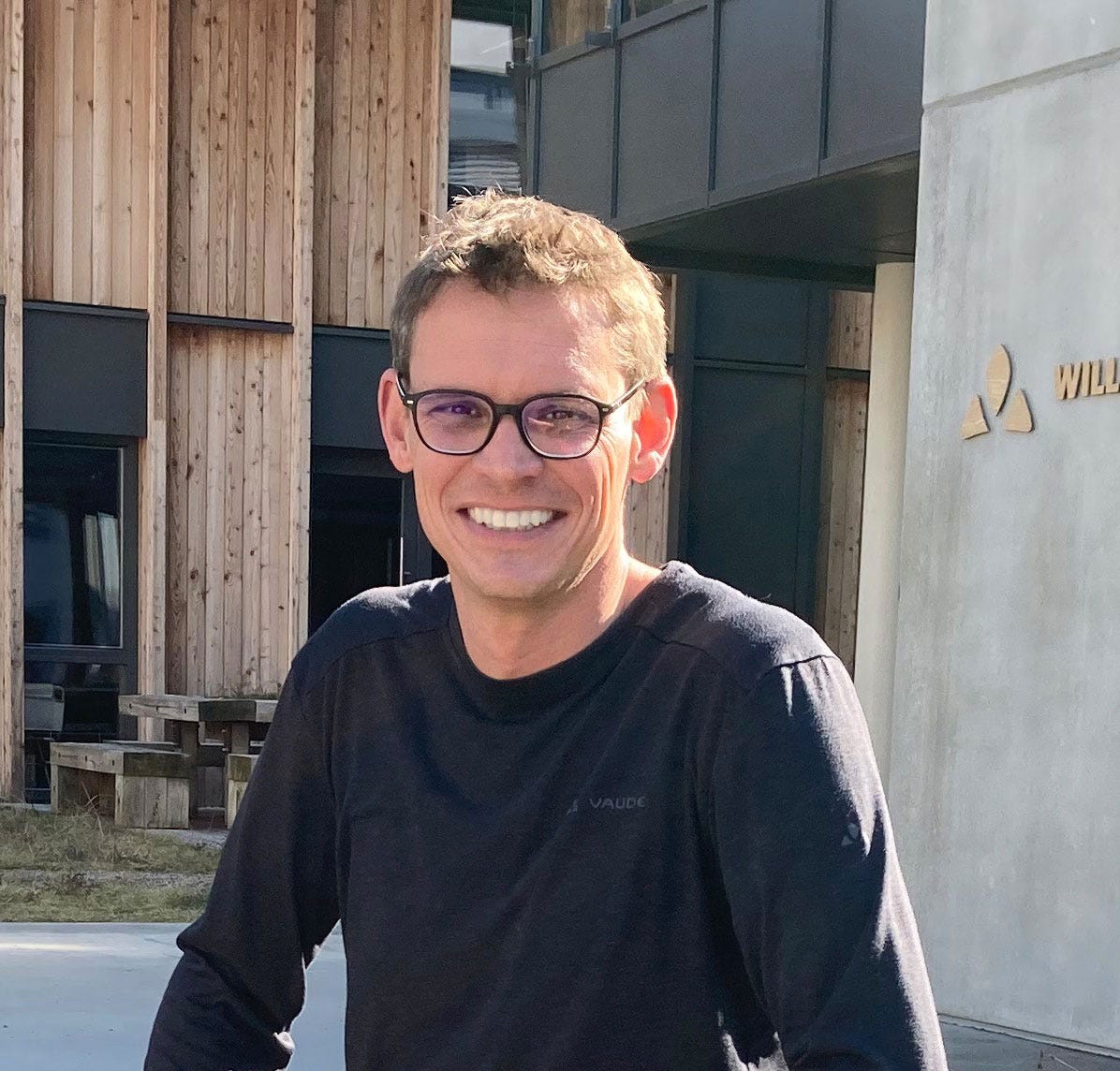

"The transition to sustainable plastic materials is usually a long road."
Recycling creates valuable raw materials
In the case of recycling, waste that would otherwise end up in the incineration plant becomes valuable raw materials. With the bike bag, the carrying system was the next step after the recycled main material and a real challenge for the development team. The back panel of a pannier bag for the luggage carrier must be UV-resistant, abrasion-resistant, dimensionally stable and impact-resistant - even in heat and cold. Here, VAUDE could not simply fall back on existing technologies. There were none. In Tettnang-Obereisenbach in Upper Swabia, new paths had to be taken: "We wanted to work with post-consumer waste. It was also important to us to implement the project in a German or European supply chain in order to keep the routes short - also in later production," Vogt explains the starting point.
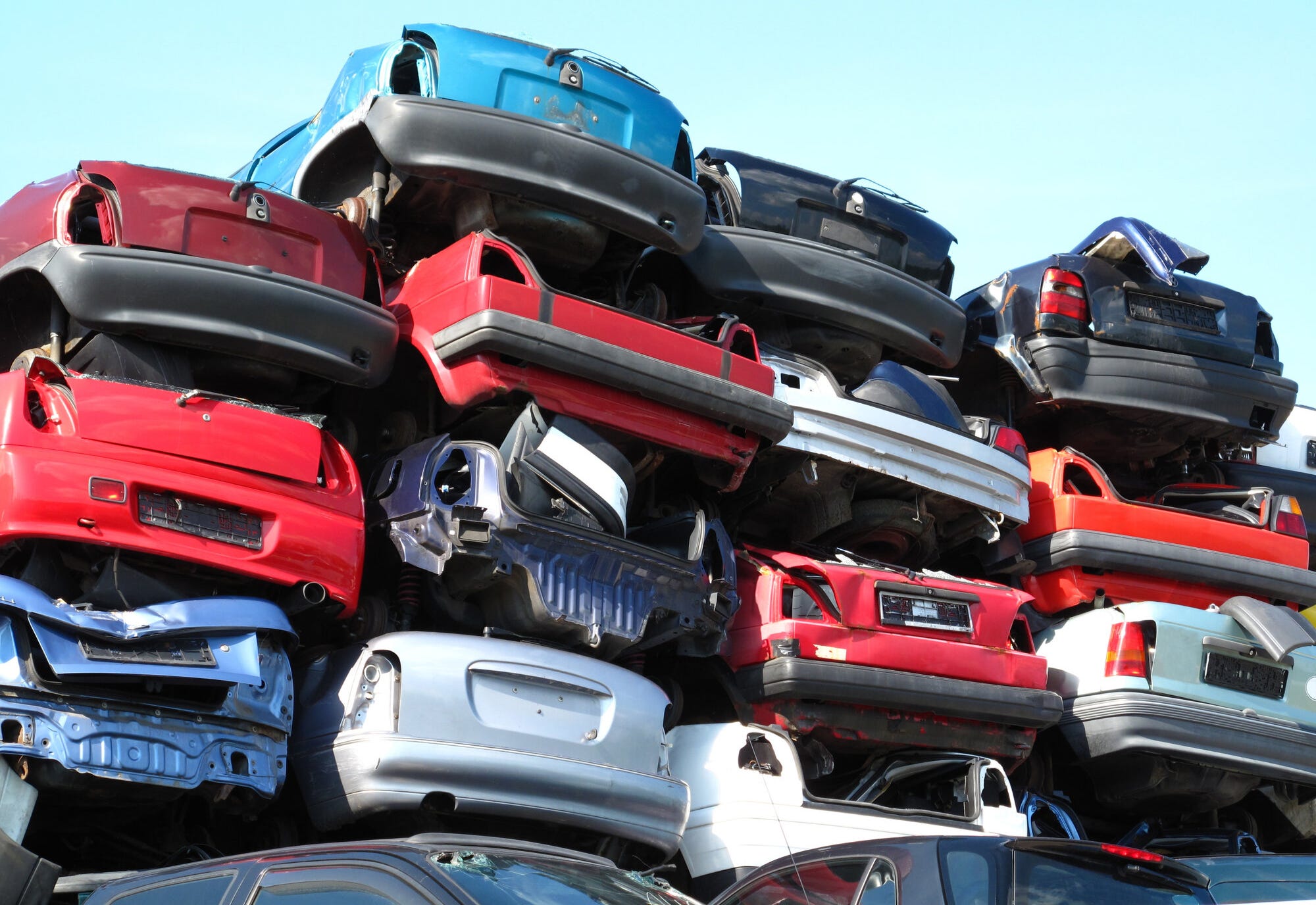

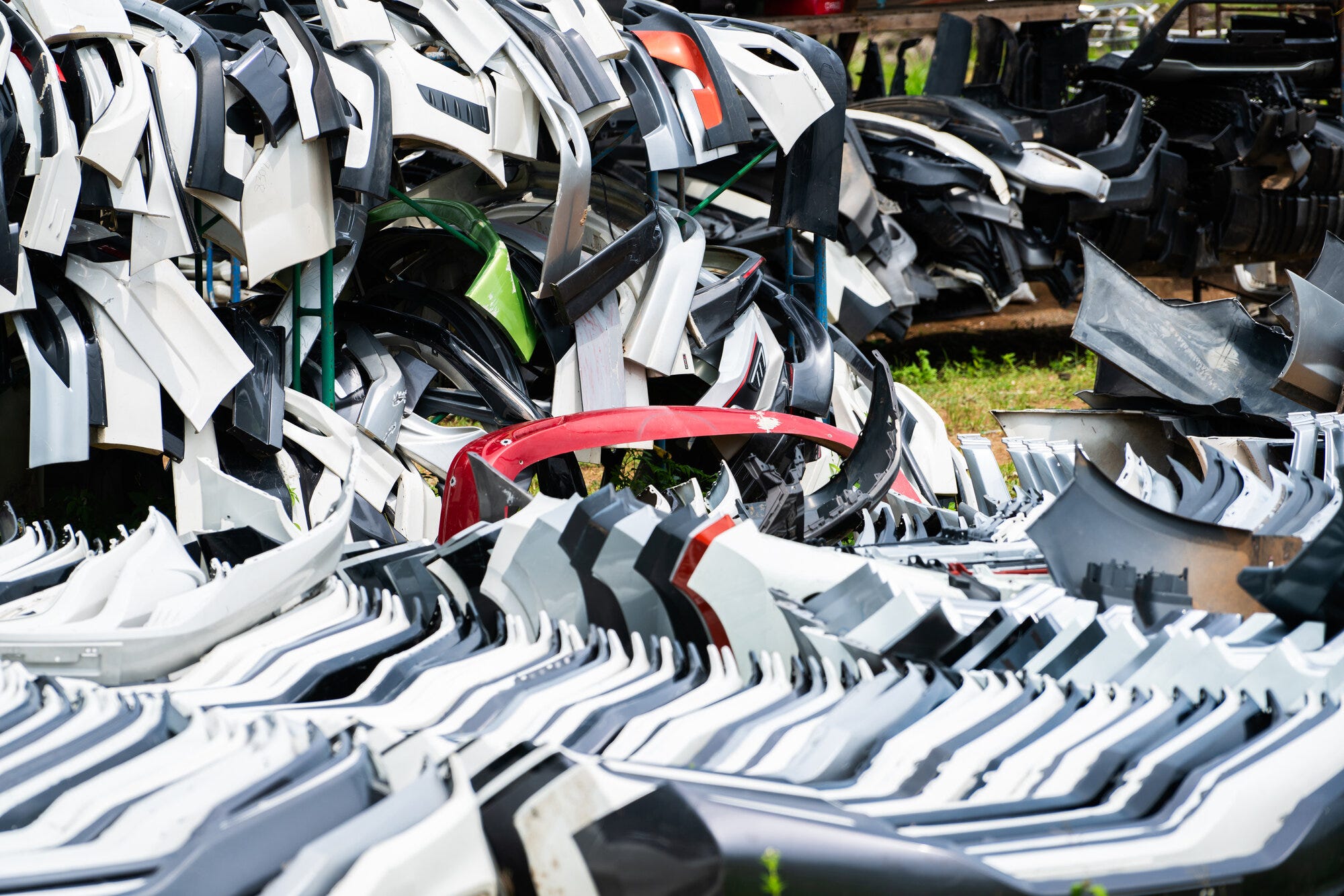

At the International Trade Fair for Plastics Processing (Fakuma), the team got into conversation with the recycling specialist WIPAG / MOCOM. They sort and clean plastic parts from cars at their plant in Gardelegen and use them to produce so-called post-consumer regranulates. The granulate is melted in the Czech Republic and molded into the shape of the back plate using an injection molding process. After the first test, it was clear that the material chosen was ideally suited to our requirements, a robust bicycle bag.
At our company headquarters in Obereisenbach, packing bags, back panels and holding systems are then assembled into finished bags in our in-house factory. The fastening hooks, which have slightly different requirements, come from another partnership. Together with Exipnos GmbH from Merseburg, we were able to find a reinforced polyamide recyclate that consists of waste from packaging production and is up to the task.
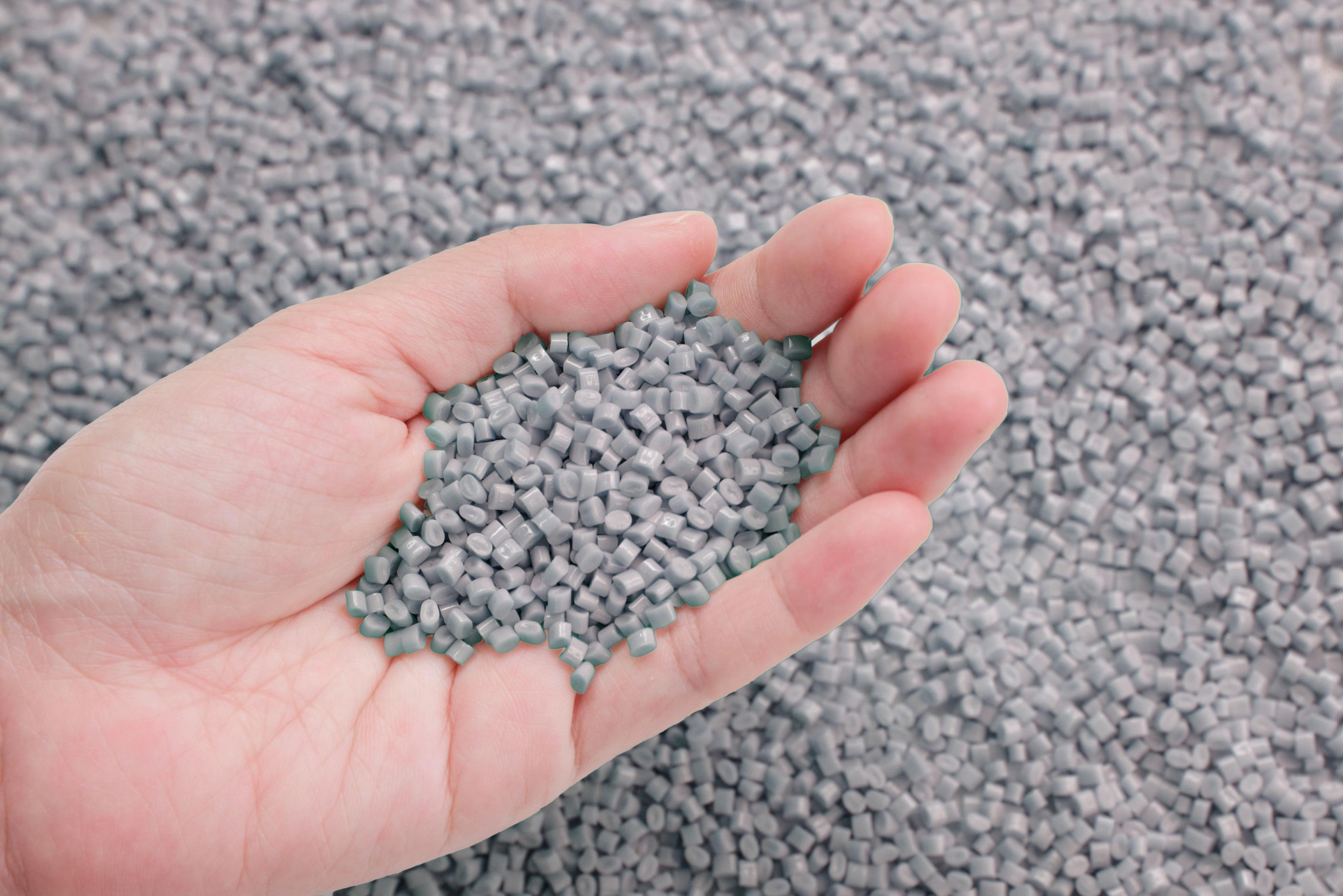

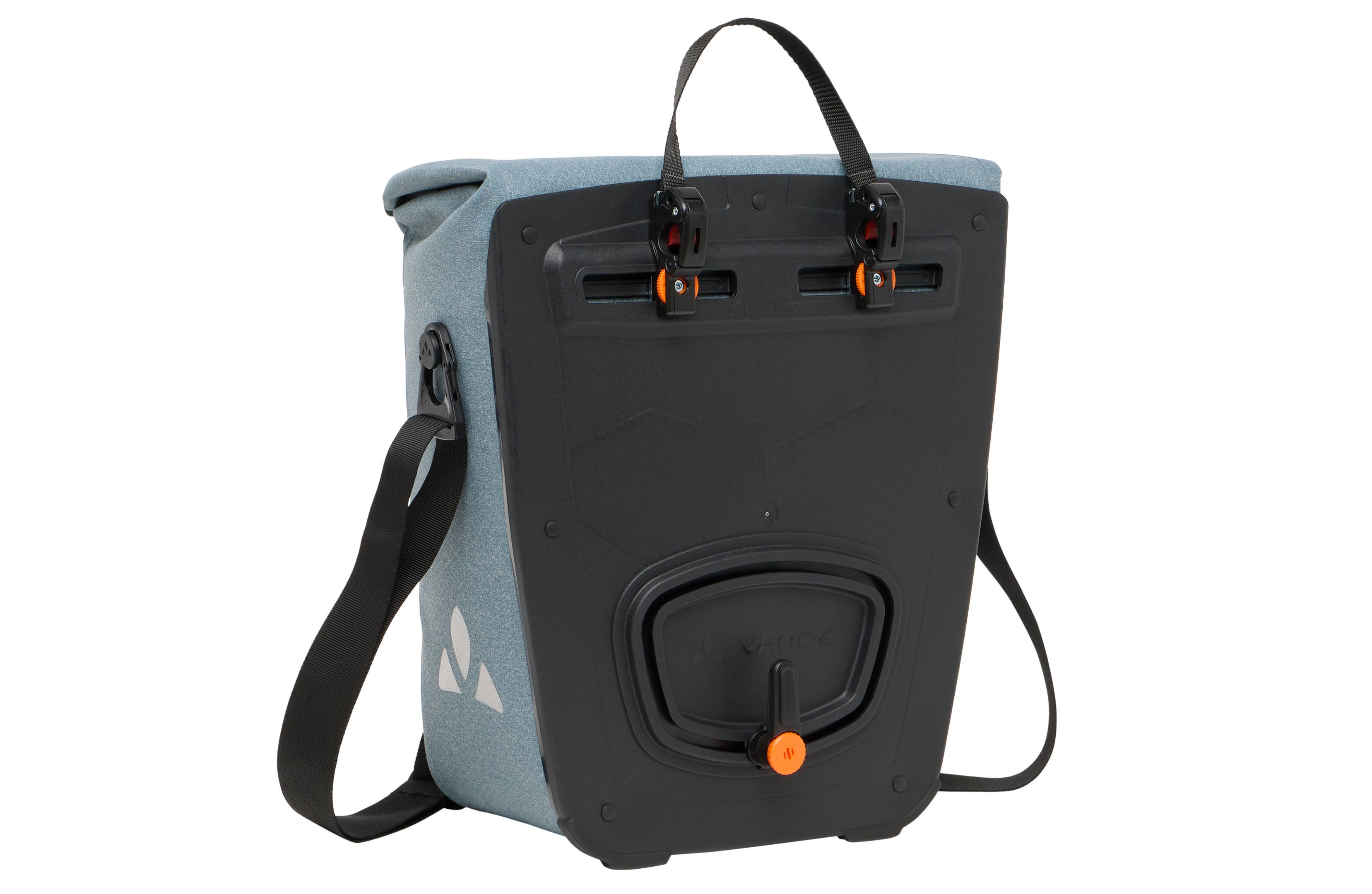

- Aqua Back Single - Bike bagRating:20%€84.00Incl. VAT, plus shipping free delivery
PVC free material
-
- Aqua Back Color bike bags, recycled main material€189.00Incl. VAT, plus shipping free delivery
With recycled material
- Aqua Back Plus bike bags, recycled main material€210.00Incl. VAT, plus shipping free delivery
With recycled material
- Aqua Back Plus Single bike bag, recycled main material€110.00Incl. VAT, plus shipping free delivery
With recycled material
- Aqua Back Luminum single II bike bag€137.00Incl. VAT, plus shipping free delivery
PVC free material
- Aqua Back Pro bike bagsRating:100%€200.00Incl. VAT, plus shipping free delivery
PVC free material
- ReCycle Back Single - Bike bagRating:100%€105.00Incl. VAT, plus shipping free delivery
With recycled material
- Aqua Transformer 2in1 backpack bike bag waterproof, 26 liters€189.00Incl. VAT, plus shipping free delivery
PVC free material
- Aqua Back Single bike bag, recycled main materialRating:20%€89.00Incl. VAT, plus shipping free delivery
With recycled material
- ReCycle Commute single bike bag€137.00Incl. VAT, plus shipping free delivery
With recycled material
In-house laboratory as key to success for highest Quality
In order to check whether the prototype could withstand the high stresses of everyday use, it was sent to the in-house test laboratory before assembly. The recycled polypropylene was able to keep up with the mechanical properties of new plastic right from the start. After this prototype had passed the standardized material tests, the bags could be tested in practice. They were mostly used by VAUDE employees in everyday life.
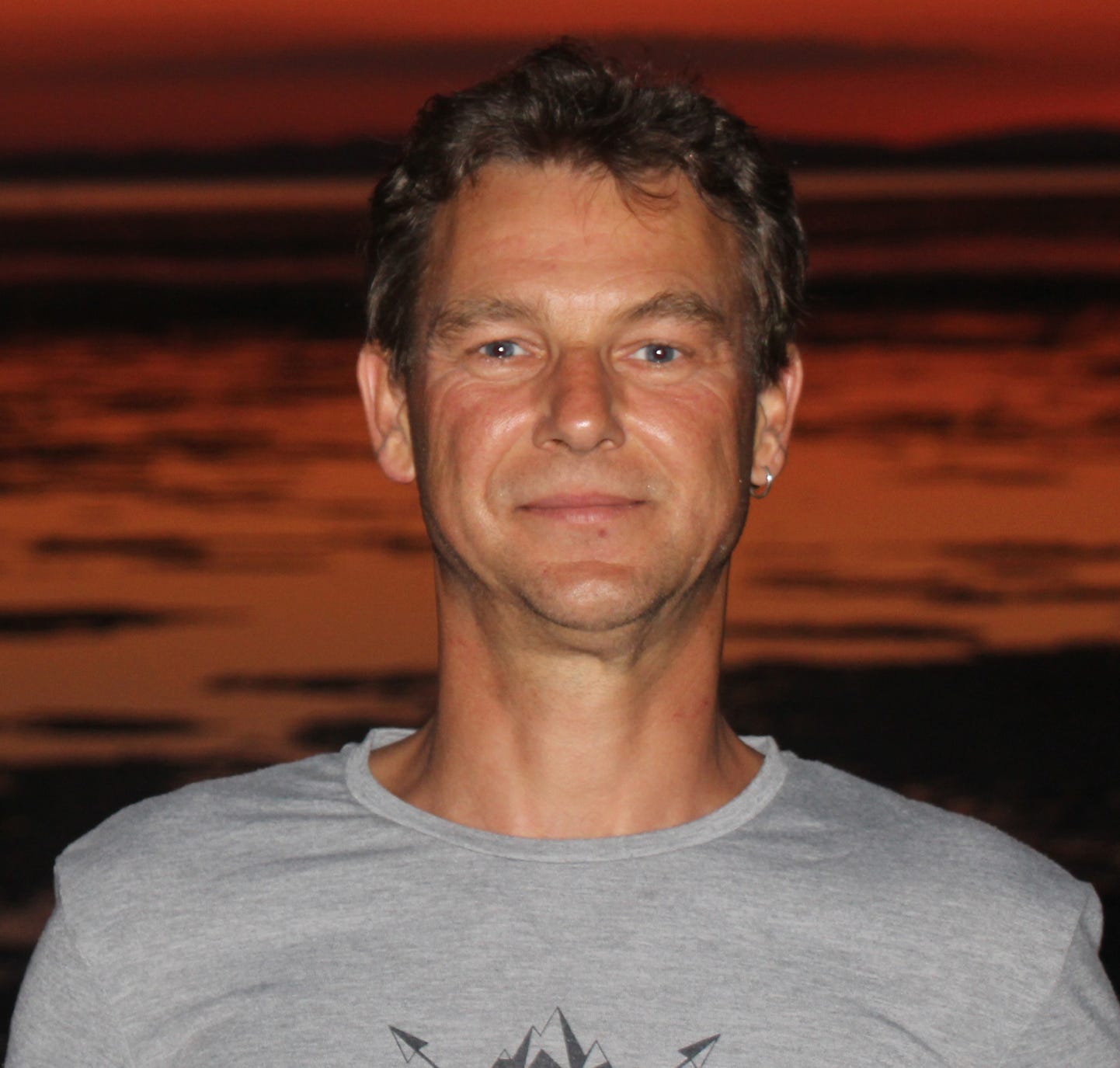

"We're not doing rocket science here, but our standards are pretty high. It was important to us that the function could at least keep up in comparison with conventional bags."
The aim was for the back panels to not only survive average German winters, but also, for example, Scandinavian climates, where temperatures of -20 °C and below are not uncommon. Even the impact resistance in this cold posed no problems for the recycled material.
Load tests are part of the development process and often allow important conclusions to be drawn. Video: VAUDE
Before series production could begin, the standardized endurance test on the test bench and final pollutant tests were carried out. Kai Vogt emphasizes: "We naturally have the same high safety standards for the ReCycle bags as for all products and did not want to make any compromises." There is no question that the first fully recycled bicycle bags were able to overcome this hurdle. We are now proud that in addition to recycling old tires for our textiles, we can also use other old car parts for our products and thus conserve valuable resources.
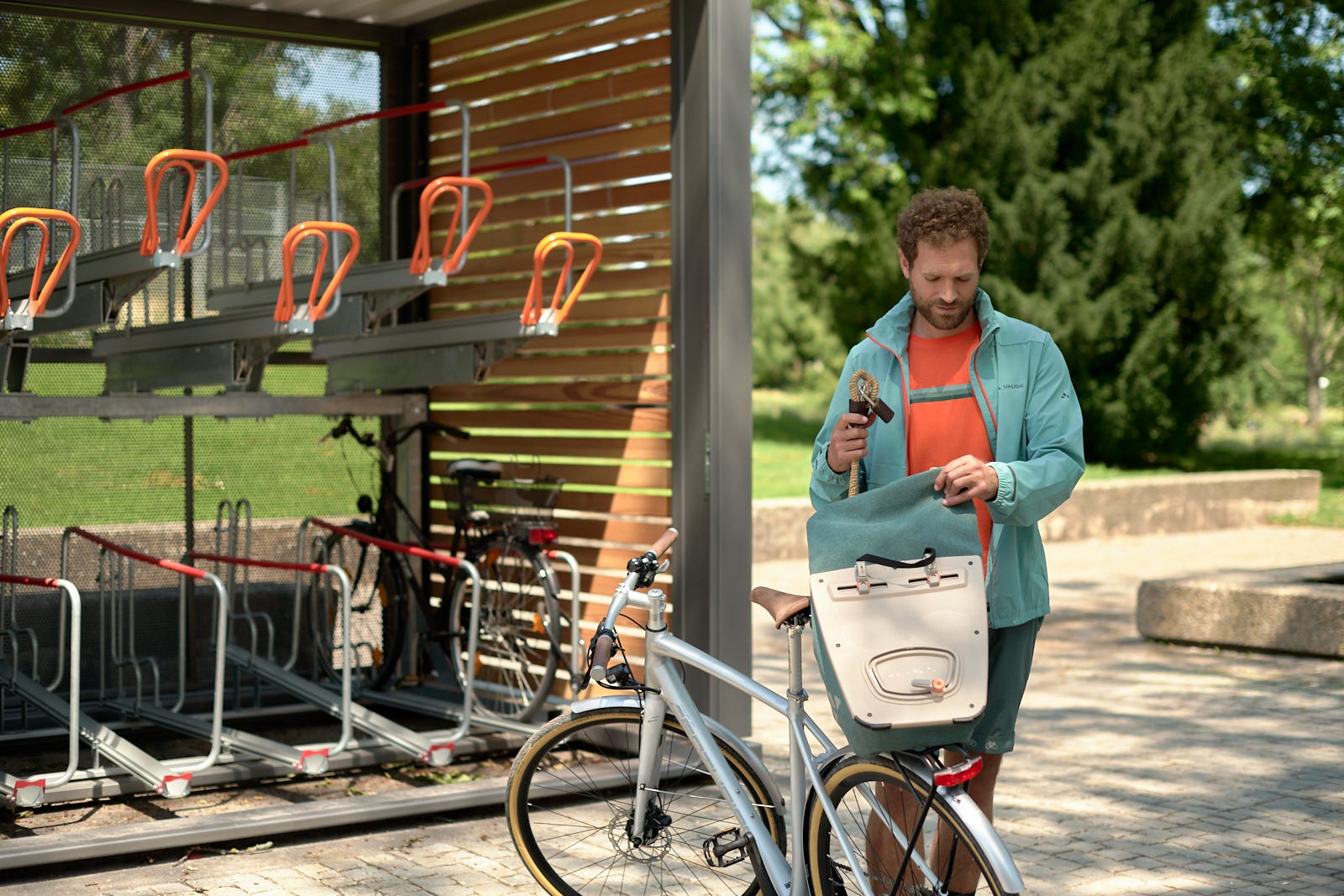

The innovative ReCycle series is in no way inferior in function to the other bags in the VAUDE range. They are, robust, welded waterproof, are hooked onto the luggage carrier with the uncomplicated QMR-2.0-System (Quick Mount Release) and klimaneutral in Deutschland manufactured.
Bike bags made in Germany:
- Proof Rack (UniKlip) pannier rack bag waterproof€126.00Incl. VAT, plus shipping free delivery
Environmentally friendly water and dirt repellent
- Proof Transformer 2in1 backpack bike bag waterproof€189.00Incl. VAT, plus shipping free delivery
Environmentally friendly water and dirt repellent
- ReCycle Transformer 26 liters, 2in1 backpack bike bag waterproof€189.00Incl. VAT, plus shipping free delivery
PVC free material
- Aqua Transformer 2in1 backpack bike bag waterproof, 26 liters€189.00Incl. VAT, plus shipping free delivery
PVC free material
- Aqua Back Color bike bags, recycled main material€189.00Incl. VAT, plus shipping free delivery
With recycled material
- Aqua Back Color Single bike bag, recycled main material€105.00Incl. VAT, plus shipping free delivery
With recycled material
- Aqua Back Plus bike bags, recycled main material€210.00Incl. VAT, plus shipping free delivery
With recycled material
- Aqua Front bike bags, recycled main material€158.00Incl. VAT, plus shipping free delivery
With recycled material
- Aqua Back bike bags, recycled main material€168.00Incl. VAT, plus shipping free delivery
With recycled material
- Aqua Back Single bike bag, recycled main materialRating:20%€89.00Incl. VAT, plus shipping free delivery
With recycled material
- Aqua Back Plus Single bike bag, recycled main material€110.00Incl. VAT, plus shipping free delivery
With recycled material
-
- Aqua Back Luminum II bike bagsRating:100%€252.00Incl. VAT, plus shipping free delivery
PVC free material
- Aqua Back Luminum single II bike bag€137.00Incl. VAT, plus shipping free delivery
PVC free material
- Aqua Back Pro bike bagsRating:100%€200.00Incl. VAT, plus shipping free delivery
PVC free material
